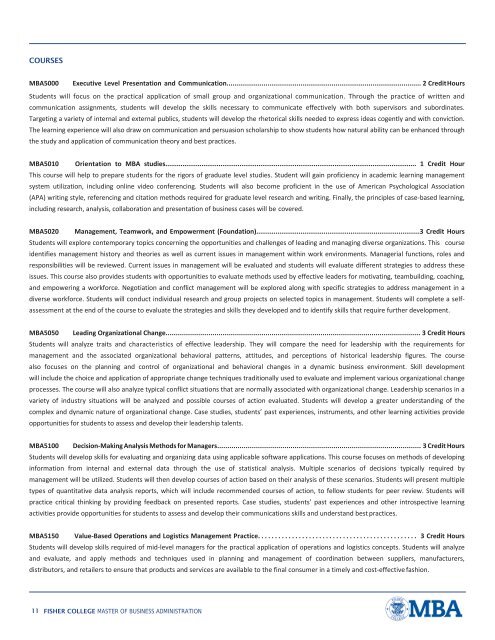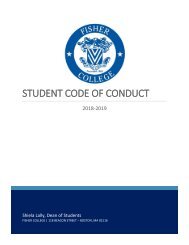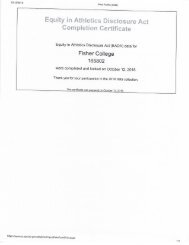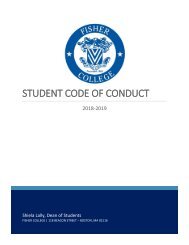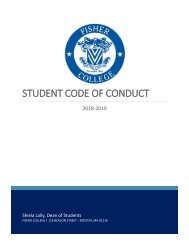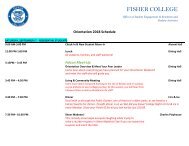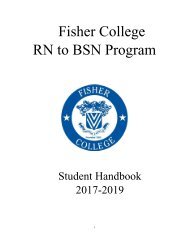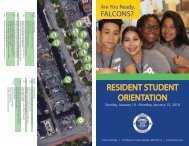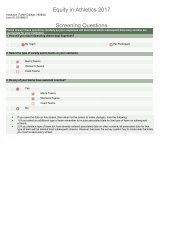MBA Catalog and Student Handbook
Create successful ePaper yourself
Turn your PDF publications into a flip-book with our unique Google optimized e-Paper software.
COURSES<br />
<strong>MBA</strong>5000 Executive Level Presentation <strong>and</strong> C omm unication.................................................................................................... 2 Credit Hours<br />
<strong>Student</strong>s will focus on the practical application of small group <strong>and</strong> organizational communication. Through the practice of written <strong>and</strong><br />
communication assignments, students will develop the skills necessary to communicate effectively with both supervisors <strong>and</strong> subordinates.<br />
Targeting a variety of internal <strong>and</strong> external publics, students will develop the rhetorical skills needed to express ideas cogently <strong>and</strong> with conviction.<br />
The learning experience will also draw on communication <strong>and</strong> persuasion scholarship to show students how natural ability can be enhanced through<br />
the study <strong>and</strong> application of communication theory <strong>and</strong> best practices.<br />
<strong>MBA</strong>5010 Orientation to <strong>MBA</strong> studies.................................................................................................................................... 1 Credit Hour<br />
This course will help to prepare students for the rigors of graduate level studies. <strong>Student</strong> will gain proficiency in academic learning management<br />
system utilization, including online video conferencing. <strong>Student</strong>s will also become proficient in the use of American Psychological Association<br />
(APA) writing style, referencing <strong>and</strong> citation methods required for graduate level research <strong>and</strong> writing. Finally, the principles of case-based learning,<br />
including research, analysis, collaboration <strong>and</strong> presentation of business cases will be covered.<br />
<strong>MBA</strong>5020 Management, Teamwork, <strong>and</strong> Empowerment (Foundation).....................................................................................3 Credit Hours<br />
<strong>Student</strong>s will explore contemporary topics concerning the opportunities <strong>and</strong> challenges of leading <strong>and</strong> managing diverse organizations. This course<br />
identifies management history <strong>and</strong> theories as well as current issues in management within work environments. Managerial functions, roles <strong>and</strong><br />
responsibilities will be reviewed. Current issues in management will be evaluated <strong>and</strong> students will evaluate different strategies to address these<br />
issues. This course also provides students with opportunities to evaluate methods used by effective leaders for motivating, teambuilding, coaching,<br />
<strong>and</strong> empowering a workforce. Negotiation <strong>and</strong> conflict management will be explored along with specific strategies to address management in a<br />
diverse workforce. <strong>Student</strong>s will conduct individual research <strong>and</strong> group projects on selected topics in management. <strong>Student</strong>s will complete a selfassessment<br />
at the end of the course to evaluate the strategies <strong>and</strong> skills they developed <strong>and</strong> to identify skills that require further development.<br />
<strong>MBA</strong>5050 Leading Organizational Change............................................................................................................................. 3 Credit Hours<br />
<strong>Student</strong>s will analyze traits <strong>and</strong> characteristics of effective leadership. They will compare the need for leadership with the requirements for<br />
management <strong>and</strong> the associated organizational behavioral patterns, attitudes, <strong>and</strong> perceptions of historical leadership figures. The course<br />
also focuses on the planning <strong>and</strong> control of organizational <strong>and</strong> behavioral changes in a dynamic business environment. Skill development<br />
will include the choice <strong>and</strong> application of appropriate change techniques traditionally used to evaluate <strong>and</strong> implement various organizational change<br />
processes. The course will also analyze typical conflict situations that are normally associated with organizational change. Leadership scenarios in a<br />
variety of industry situations will be analyzed <strong>and</strong> possible courses of action evaluated. <strong>Student</strong>s will develop a greater underst<strong>and</strong>ing of the<br />
complex <strong>and</strong> dynamic nature of organizational change. Case studies, students’ past experiences, instruments, <strong>and</strong> other learning activities provide<br />
opportunities for students to assess <strong>and</strong> develop their leadership talents.<br />
<strong>MBA</strong>5100 Decision-Making Analysis Methods for Managers.................................................................................................... 3 Credit Hours<br />
<strong>Student</strong>s will develop skills for evaluating <strong>and</strong> organizing data using applicable software applications. This course focuses on methods of developing<br />
information from internal <strong>and</strong> external data through the use of statistical analysis. Multiple scenarios of decisions typically required by<br />
management will be utilized. <strong>Student</strong>s will then develop courses of action based on their analysis of these scenarios. <strong>Student</strong>s will present multiple<br />
types of quantitative data analysis reports, which will include recommended courses of action, to fellow students for peer review. <strong>Student</strong>s will<br />
practice critical thinking by providing feedback on presented reports. Case studies, students’ past experiences <strong>and</strong> other introspective learning<br />
activities provide opportunities for students to assess <strong>and</strong> develop their communications skills <strong>and</strong> underst<strong>and</strong> best practices.<br />
<strong>MBA</strong>5150 Value-Based Operations <strong>and</strong> Logistics Management Practice............................................... 3 Credit Hours<br />
<strong>Student</strong>s will develop skills required of mid-level managers for the practical application of operations <strong>and</strong> logistics concepts. <strong>Student</strong>s will analyze<br />
<strong>and</strong> evaluate, <strong>and</strong> apply methods <strong>and</strong> techniques used in planning <strong>and</strong> management of coordination between suppliers, manufacturers,<br />
distributors, <strong>and</strong> retailers to ensure that products <strong>and</strong> services are available to the final consumer in a timely <strong>and</strong> cost-effective fashion.<br />
11 FISHER COLLEGE MASTER OF BUSINESS ADMINISTRATION


